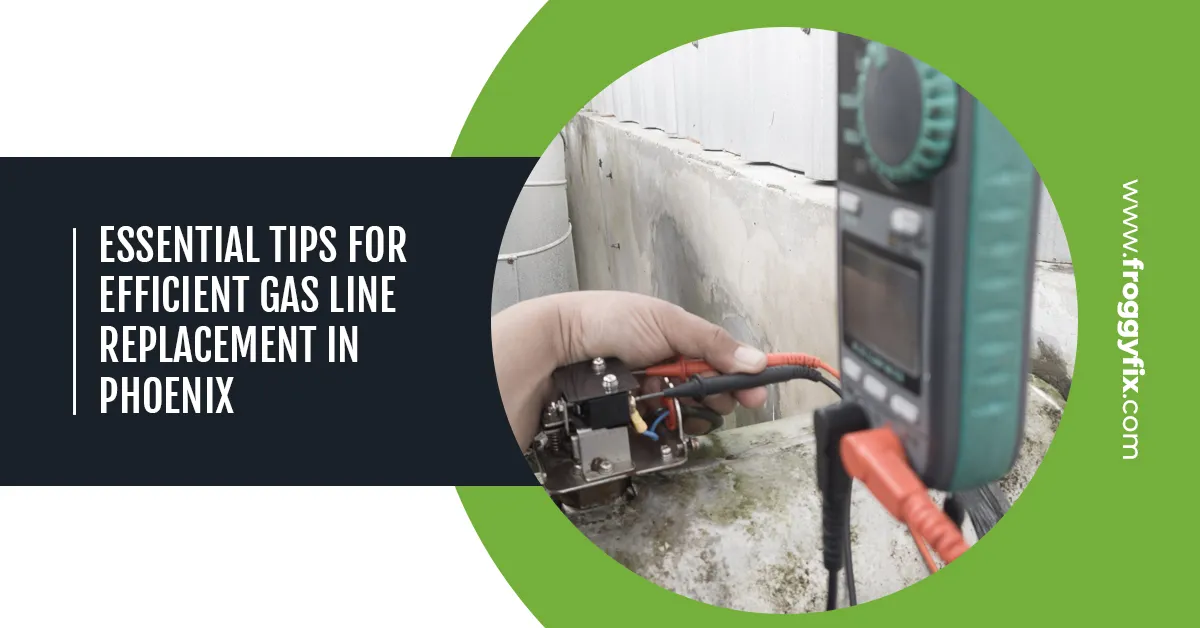

25 01
2024
Gas line replacement is a crucial aspect of maintaining a safe and efficient home in Phoenix. Knowing how often to replace natural gas lines, when to consider gas pipe replacement, understanding the depth code in Arizona, and addressing leaking gas lines are essential for homeowners. Let’s explore these aspects to ensure a seamless and secure gas line replacement in Phoenix.
Natural gas lines are designed to be durable, but they are not invincible. The frequency of replacement depends on various factors, including the material of the pipes, environmental conditions, and regular inspections. As a general guideline, consider replacement every 20 to 25 years. However, regular inspections by qualified professionals in Phoenix can provide a more accurate assessment based on the specific conditions of your gas lines.
Several signs indicate the need for gas line replacement:
Corrosion and Rust: Visible signs of corrosion or rust on the gas pipes are clear indicators that replacement is necessary. These issues can compromise the integrity of the pipes and pose safety risks.
Gas Leaks: If you detect the distinct smell of natural gas or suspect a leak, immediate replacement is crucial for safety. Gas leaks are hazardous and require prompt attention from professionals in Phoenix specializing in gas line replacement.
Outdated Materials: Homes with older gas lines made from materials such as galvanized steel or cast iron may require replacement. Upgrading to more modern and corrosion-resistant materials enhances safety and efficiency.
Visible Damage: Physical damage to gas pipes, whether due to accidents or wear and tear, is a clear signal for replacement. Damaged pipes compromise the safety and reliability of the entire gas system.
In Arizona, the depth code for gas pipes is regulated to ensure safety during installations and replacements. Gas pipes must be buried at a minimum depth of 18 inches beneath the surface. This depth protects against external factors like landscaping activities and ensures the stability of the gas lines. Compliance with depth codes is crucial during gas line replacement projects in Phoenix to adhere to safety standards and prevent damage.
Addressing a leaking natural gas line requires immediate action to prevent potential hazards. Here are the essential steps to take:
Evacuation: If you suspect a gas leak, evacuate the premises immediately. Do not use any electrical appliances or switches, as sparks could ignite the gas.
Emergency Services: Contact your local gas company or emergency services to report the leak. They will dispatch professionals to assess and address the situation.
Do Not Attempt Repairs: Never attempt to repair a leaking gas line yourself. Gas line repairs and replacements should only be handled by licensed and experienced professionals in Phoenix.
Professional Inspection: After the emergency response, consult with a qualified gas line replacement expert in Phoenix. They will conduct a thorough inspection, identify the cause of the leak, and recommend appropriate measures, which may include a complete gas line replacement.
When considering gas line replacement, entrust the job to experienced and licensed professionals. Look for the following qualities in the service provider:
Licensing and Certification: Ensure that the professionals are licensed and certified to perform gas line replacement. This guarantees compliance with safety regulations and industry standards.
Experience: Choose a service provider with a proven track record in gas line replacement. Experience indicates a thorough understanding of the local conditions and requirements in Phoenix.
Customer Reviews: Check customer reviews and testimonials to gauge the reliability and satisfaction of past clients. Positive feedback is a good indicator of the service provider’s competence.
Emergency Services: Opt for professionals who offer emergency gas line replacement services in Phoenix. Gas emergencies can happen at any time, and a quick response is crucial to preventing potential dangers. To learn more about gas line replacement services, check this out https://froggyfix.com/gas-line-replacement-in-phoenix-ensuring-safety-and-efficiency/.
Professional gas line replacement in Phoenix begins with a comprehensive inspection. Experts will assess the condition of existing gas lines, identify potential issues, and determine the most suitable replacement approach.
Choosing the right materials for gas line replacement is crucial for longevity and safety. Modern materials like polyethylene and corrugated stainless steel offer corrosion resistance, enhancing the durability of the gas system in Phoenix’s diverse environmental conditions.
Gas line replacement projects in Phoenix must adhere to local building codes and regulations. Professionals ensure that all necessary permits are obtained and that the replacement process follows safety standards to the letter.
When digging is required for gas line replacement, professionals employ efficient excavation techniques to minimize disruption to landscaping and property. This ensures a swift and tidy replacement process.
Implement routine inspections of your gas lines in Phoenix. Professional inspections can identify potential issues early, preventing the need for extensive replacements and ensuring the continued safety of your home.
Be mindful of your landscaping activities around gas lines. While the depth code mandates a specific burial depth, avoiding unnecessary digging or planting deep-rooted trees near gas lines can prevent accidental damage.
Act immediately upon detecting any signs of a gas leak. The distinct odor of natural gas, hissing sounds, or dead vegetation near gas lines may indicate a leak. Swift action can prevent emergencies and the need for extensive gas line replacements in Phoenix.
Opt for eco-friendly materials during gas line replacement in Phoenix. Environmentally conscious choices contribute to sustainability and align with the city’s commitment to green practices.
Effective gas line replacement reduces the likelihood of leaks, preventing the release of methane, a potent greenhouse gas. By prioritizing leak prevention, homeowners in Phoenix contribute to environmental conservation efforts.
Efficient gas line replacement in Phoenix is not just about reacting to issues; it’s about proactive maintenance and ensuring the safety of your home. By understanding the signs for replacement, following industry codes, and choosing the right professionals, homeowners can navigate gas line replacements seamlessly.